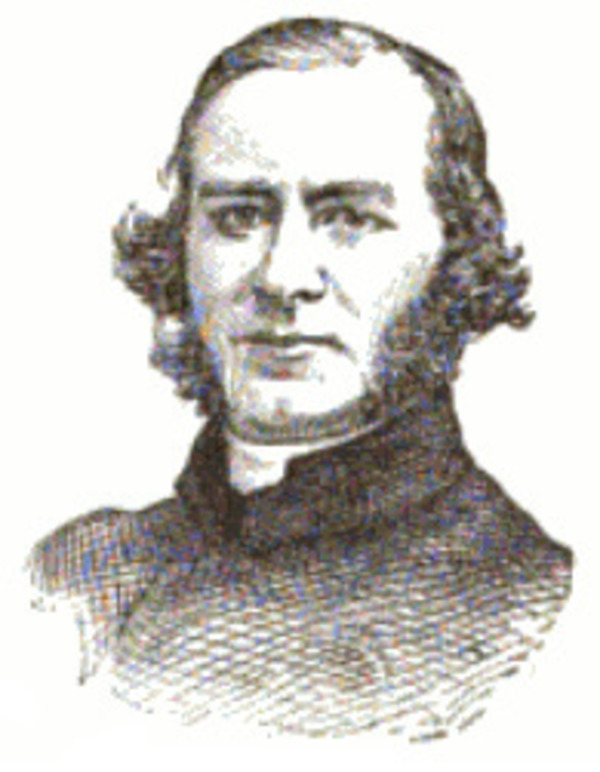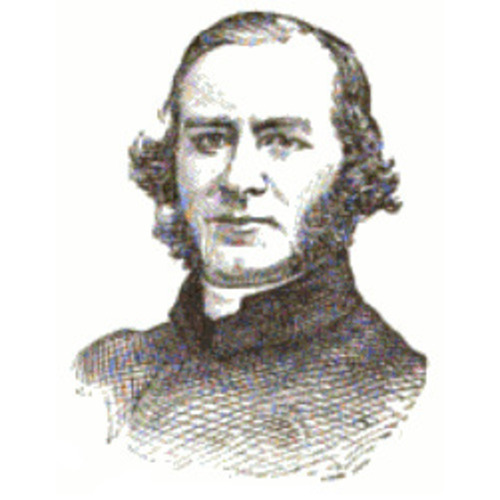
Source: Link
LOWELL, ROBERT TRAILL SPENCE, Church of England clergyman, office holder, and author; b. 8 Oct. 1816 in Boston, son of Unitarian minister Charles Lowell and Harriet Brackett Spence, elder brother of poet and literary critic James Russell Lowell; m. 28 Oct. 1845 Mary Ann Duane, and they had three daughters, one of whom died at the age of 17, and four sons; great-grandfather of the celebrated 20th-century poet Robert Traill Spence Lowell; d. 12 Sept. 1891 in Schenectady, N.Y.
Robert Traill Spence Lowell, a member of a distinguished Massachusetts family, received his early education at Round Hill School in Northampton, Mass., and afterwards attended Harvard University, from which he graduated in 1833. He pursued studies in medicine for several years without completing a degree and then entered business with his eldest brother, Charles Russell. After three years Lowell decided to train for ministry in the Protestant Episcopal Church (the church in which his mother had been raised) under the Reverend Alonzo Potter in Schenectady. Potter, a moral and political philosopher and the future bishop of Pennsylvania, was a friend of the Lowell family and at that time vice-president of Union College.
After completing his theological examinations and taking an ma at Harvard, Lowell was admitted in 1842 by Bishop Alexander Viets Griswold of Boston as a candidate for ordination in the eastern diocese (comprised of Episcopal churches in Massachusetts, Maine, Rhode Island, Vermont, and New Hampshire). At Harvard in the fall of 1842 he met Aubrey George Spencer*, Anglican bishop of Newfoundland and Bermuda. Desiring employment “as a missionary in the English Church” and recommended by excellent testimonials, Lowell was transferred into the charge of Bishop Spencer and followed him to Bermuda. He was ordained deacon on 5 Dec. 1842 in St Peter’s Church, St George, and priest the following March. During his stay in Bermuda he served as domestic chaplain to the bishop and as inspector of schools in the colony. Lowell, Griswold, and Spencer were kindred spirits in religion. As members of the low church party within Anglicanism they espoused an evangelical theology and piety, strongly supported missionary activities, and feared the spread of the budding Tractarian movement in North America. In 1842 Bishop Spencer recommended his ordinand to the Society for the Propagation of the Gospel in London as a vigorous 26-year-old “unmarried man, . . . possessed of some private fortunes, . . . a good scholar, and apparently very pious and zealous, with an excellent temper, clear judgement and strong attachment to the Mother Church.”
Shortly after his ordination Lowell asked for and was given the missionary station of Bay Roberts, Nfld, vacated by the death of William Henry Grant. A major fishing town on Conception Bay with a population of about 1,500 at the time Lowell arrived, it had experienced a considerable growth in population during the 1830s and early 1840s. In May 1843 he became the third resident minister of St Matthew’s, built 16 years earlier for the more than 500 practising Anglicans in the town. Besides this main charge he served the Anglican communities in Spaniard’s Bay and New Harbour, Trinity Bay. He returned to the United States two years later to marry Mary Ann Duane, and their first child was born in Bay Roberts early in 1847.
During 1846–47 Newfoundland experienced a severe famine, brought on by the failure of the inshore fishery and a potato blight. The situation was aggravated by a lack of political leadership in St John’s after the departure of Governor Sir John Harvey* and by the absence of a local poor law and adequate policies and means to administer relief in the outports. Lowell served as relief commissioner for the Bay Roberts region and sought an equitable distribution of aid in the face of profiteering by local merchants and the partiality of politicians. After breaking down, as he later reported, “by serving and sharing with my parishioners,” Lowell returned to the United States in the summer of 1847. He did not come back to Newfoundland. The local merchants’ dissatisfaction with him and the radically different outlook of Edward Feild*, a Tractarian who had replaced the evangelical Spencer as bishop in 1844, as well as Feild’s anti-American stance, had also contributed to his departure.
In the United States Lowell undertook a successful fund-raising campaign for famine victims in Newfoundland. In his evangelical ethos private charities represented the means through which divine care and providence expressed themselves. After rectories in Newark, N.J., and Duanesburg, N.Y., and some years spent as headmaster of St Mark’s School in Southboro, Mass., in 1873 he became professor of Latin language and literature at Union College in Schenectady, a position he held until his retirement six years later. He died there in 1891 and lies buried in Vale Cemetery.
Eleven years after leaving Newfoundland, Lowell published a novel, The new priest in Conception Bay (2v., Boston, 1858), that drew upon his experiences as a missionary in Bay Roberts. Although the work depicts with some narrative skill the pastimes and the adversities of people in a mid-19th-century Newfoundland outport, it suffers from an ideological preoccupation with anti-Catholicism and an improbable cast of characters. The author denies that it is a religious novel, but the plot and characters betray it as such. Lucy Barbury, the Anglican heroine in love with a young man preparing for the priesthood, has mysteriously disappeared. Roman Catholics, especially a fiendish Jesuit, play treacherous roles in the story while Protestants exemplify the superior values of the author himself. Lowell successfully exploits the ethnic make-up of Newfoundland society through the use of dialect in local discourse. He destroys the authenticity of his version of outport life, however, with didactic intrusions, and he reduces the complexity of human character to stereotypes of evangelical moral canons. In the words of American critic Harold William Blodget, “He was a poet in depicting landscape and a shrewd interpreter of character, and a preacher-philosopher in setting forth ethical values, but he was not a good manipulator of event.”
Of Lowell’s literary work this novel received the greatest acclaim from contemporary reviewers. It was republished in a new edition in 1864 and in a revised edition in 1889. His stay in Newfoundland was also the inspiration for a short story, “A raft that no man made,” first published in the Atlantic Monthly (Boston) in March 1862, and for a number of poems, most of them written while he was still on the island. (He became known among his contemporaries primarily for his patriotic American verse.) The poem “To my old parishioners,” a David Blackwood print in rhyme, much closer to Lowell’s original missionary experience than The new priest in Conception Bay, evokes the stark and tragic dimensions of 19th-century outport existence.
Sources for Lowell’s early life and career include Memorials of the class of 1833 of Harvard College, prepared for the fiftieth anniversary of their graduation, ed. Waldo Higginson (Cambridge, Mass., 1883), and New York Public Library, mss and Arch. Division, J. R. Lowell papers, Lowell to Robert Carter, 13 Jan. 1848. For the Lowell family of Massachusetts see Ferris Greenslet, The Lowells and their seven worlds (Boston, 1946). Lowell’s stay in Bermuda and Newfoundland has been constructed from the following sources: the Royal Gazette, and Bermuda Commercial and General Advertiser and Recorder (Hamilton), 13 Dec. 1842; Bishop Spencer’s letters to the SPG in the USPG records, available on microfilm at NA (MG 17, B1, C/Nfl., box II/23, folder 279, and G.1: 22, 27–28, 34); Bishop Feild’s letters to the SPG (C/Nfl., box II/25, folders 295, 306, and G.1); Lowell’s reports to the SPG (C/Nfl., box II/26, folder 309, and G.1); his description of his Bay Roberts parish, dated 15 Aug. 1846 (E/Nfl., 1845–46); and his letter of 16 Nov. 1859 to the American social reformer Dorothea Lynde Dix in her papers at Harvard College Library, Houghton Library (Cambridge).
For Lowell’s role as relief commissioner during the famine of 1846/47 see his article dated 28 Nov. 1847 in the Times and General Commercial Gazette (St John’s), 8 Jan. 1848; and PANL, GN 2/1, 46: 141, 153–54, 174; GN 2/2, 31 Dec. 1847.
The most comprehensive bibliography of Lowell’s literary work is in Jacob Blanck, Bibliography of American literature (7v. to date, New Haven, Conn., and London, 1955– ), 6: 106–11. His poem “To my old parishioners” appears in Fresh hearts that failed three thousand years ago; with other things, by the author of “The new priest in Conception Bay” (Boston, 1860), 96–100, and in The poems of Robert Lowell (new ed., Boston, 1864), 151–56. In addition to the works mentioned in the biography, Lowell’s Five letters, occasioned by published assertions of a Roman Catholic priest (Newark, N.J., 1853) is relevant to his portrayal of Newfoundland.
Biographical and critical studies include DAB; Philip Hiscock, “Dialect representation in R. T. S. Lowell’s novel The new priest in Conception Bay,” Languages in Newfoundland and Labrador, ed. H. J. Paddock (St John’s, 1982), 14–23; Patrick O’Flaherty’s introduction to the New Canadian Library edition of The new priest in Conception Bay (Toronto, 1974), 1–5, and his book The Rock observed: studies in the literature of Newfoundland (Toronto, 1979) (the latter work includes a portrait of Lowell as a young man); and H. [W.] Blodgett, “Robert Traill Spence Lowell,” New England Magazine ([Portland, Maine]), 16 (1943): 578–91.
Cite This Article
Hans Rollmann, “LOWELL, ROBERT TRAILL SPENCE,” in Dictionary of Canadian Biography, vol. 12, University of Toronto/Université Laval, 2003–, accessed December 31, 2025, https://www.biographi.ca/en/bio/lowell_robert_traill_spence_12E.html.
The citation above shows the format for footnotes and endnotes according to the Chicago manual of style (16th edition). Information to be used in other citation formats:
| Permalink: | https://www.biographi.ca/en/bio/lowell_robert_traill_spence_12E.html |
| Author of Article: | Hans Rollmann |
| Title of Article: | LOWELL, ROBERT TRAILL SPENCE |
| Publication Name: | Dictionary of Canadian Biography, vol. 12 |
| Publisher: | University of Toronto/Université Laval |
| Year of publication: | 1990 |
| Year of revision: | 1990 |
| Access Date: | December 31, 2025 |



